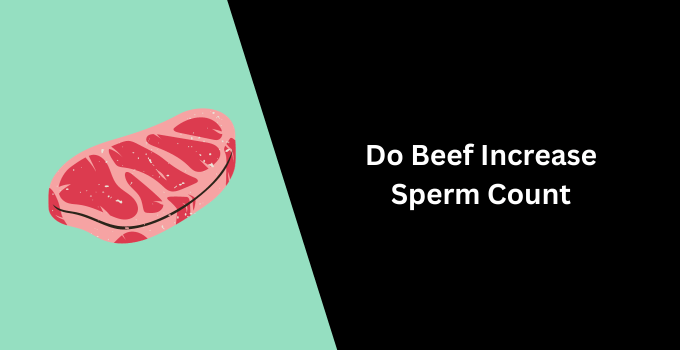Yes, beef can increase sperm count due to its high levels of essential nutrients. Zinc, selenium, and vitamin B12 in beef improve sperm count, motility, and overall health. Carnitine in beef also boosts sperm motility and morphology.
However, consuming excessive amounts of beef, especially processed forms, may introduce saturated fats, hormones, and environmental contaminants, negatively impacting sperm health. To achieve the benefits, focus on moderate intake and lean cuts. Balancing beef consumption with a healthy diet guarantees peak sperm health. Learn more about how to integrate beef into your diet effectively.
Quick Answer
Yes, beef can potentially increase sperm count, but it’s essential to maintain a balanced diet for overall reproductive health.
What Are the Benefits of Beef on Sperm Count?
When it comes to boosting sperm count, beef offers several key nutrients that can make a significant difference. Beef is rich in zinc, which improves sperm count, motility, and morphology.
Additionally, selenium found in beef supports male fertility and overall sperm health. These minerals play vital roles in enhancing reproductive functions.
Moreover, beef contains vitamin B12, essential for sperm development, and carnitine, which enhances sperm motility and morphology.
The combined benefits of these nutrients make beef a valuable addition to your diet if you’re looking to improve your sperm count. Incorporating beef into your meals can provide these essential elements, contributing positively to your reproductive health.
What Are the Risks of Beef on Sperm Count?
Despite its benefits, consuming beef can also pose certain risks to your sperm count. High intake of beef, especially processed forms, can lead to increased levels of saturated fats and cholesterol in your diet. This can negatively impact sperm health by contributing to obesity and cardiovascular problems, which are linked to lower sperm count.
Additionally, beef treated with hormones or antibiotics may interfere with your endocrine system, affecting sperm production. The presence of environmental contaminants like pesticides and heavy metals in beef can also pose risks to sperm health.
What Nutrients in Beef Are Beneficial for Sperm Increase?
Incorporating beef into your diet can provide essential nutrients like zinc, selenium, vitamin B12, and carnitine, all of which are known to boost sperm count and improve overall sperm health. Zinc plays an important role in enhancing sperm count, motility, and morphology.
Selenium supports male fertility by improving various sperm parameters. Vitamin B12 is essential for sperm development and maintaining overall sperm health. Carnitine helps improve sperm motility and morphology, contributing to a higher sperm count.
What Is the Recommended Beef Intake for Optimal Sperm Health?
The recommended beef intake for optimal sperm health is 90 gram per day. When considering beef intake for peak sperm health, it’s important to balance the benefits with potential risks. Consuming moderate amounts of beef, rich in zinc, selenium, and vitamin B12, can boost sperm count and quality.
However, excessive consumption may have adverse effects, and the method of preparation could also play a role in maximizing these benefits.
Are There Risks of Excessive Beef Consumption for Sperm Count?
Yes, consuming too much beef can lead to an increased intake of saturated fats, which may negatively impact your sperm count and overall fertility. Excessive beef consumption raises your saturated fat intake, leading to potential fertility issues.
To avoid this negative impact, it’s essential to maintain a balanced diet. Moderate beef consumption is key; aim for lean cuts to benefit from essential nutrients like zinc, vitamin B12, and selenium, which are beneficial for sperm production.
Including a variety of nutrient-rich foods alongside beef can support your overall sperm health. By consuming beef in moderation and focusing on a healthy diet and lifestyle, you can contribute positively to your sperm count and motility.
Do Different Beef Preparation Methods Impact Sperm Count Differently?
While maintaining a balanced diet is essential, the way you prepare beef can also greatly impact your sperm count and overall fertility. Different beef preparation methods affect the nutrient content.
Grilled or roasted beef tends to retain more nutrients beneficial for sperm health compared to fried or processed beef. Consuming lean cuts of beef in moderation as part of a balanced diet supports ideal sperm health.
Overconsumption of high-fat or processed beef products may harm your sperm count and fertility. Including beef in a varied diet, along with other nutrient-rich foods, can promote overall reproductive health.
Why Does Processed Meat Decrease Sperm Count?
Processed meats can decrease sperm count due to their high levels of trans fats and harmful preservatives. When you consume processed meat, you’re exposing yourself to trans fats which can harm sperm production. This often leads to altered sperm motility and decreased sperm counts.
Moreover, the preservatives and additives commonly found in processed meats like hot dogs, sausages, and bacon can negatively impact male fertility. Regular processed meat consumption is linked to a reduced chance of achieving pregnancy.
To improve sperm count and overall fertility, it’s wise to limit your intake of these foods. By doing so, you can support healthier sperm production and enhance your reproductive health.
Affiliate Disclosure: Some of the links in this post are affiliate links, which means I may earn a small commission if you make a purchase through those links. This comes at no extra cost to you. Thank you for your support!



